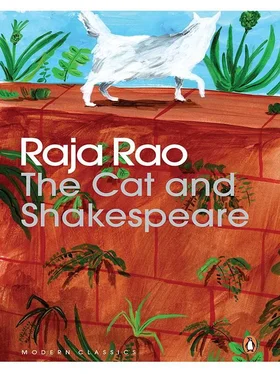Rao Raja - The Cat and Shakespeare
Здесь есть возможность читать онлайн «Rao Raja - The Cat and Shakespeare» весь текст электронной книги совершенно бесплатно (целиком полную версию без сокращений). В некоторых случаях можно слушать аудио, скачать через торрент в формате fb2 и присутствует краткое содержание. Год выпуска: 2014, Издательство: Penguin, Жанр: Современная проза, на английском языке. Описание произведения, (предисловие) а так же отзывы посетителей доступны на портале библиотеки ЛибКат.
- Название:The Cat and Shakespeare
- Автор:
- Издательство:Penguin
- Жанр:
- Год:2014
- ISBN:нет данных
- Рейтинг книги:4 / 5. Голосов: 1
-
Избранное:Добавить в избранное
- Отзывы:
-
Ваша оценка:
- 80
- 1
- 2
- 3
- 4
- 5
The Cat and Shakespeare: краткое содержание, описание и аннотация
Предлагаем к чтению аннотацию, описание, краткое содержание или предисловие (зависит от того, что написал сам автор книги «The Cat and Shakespeare»). Если вы не нашли необходимую информацию о книге — напишите в комментариях, мы постараемся отыскать её.
The Cat and Shakespeare — читать онлайн бесплатно полную книгу (весь текст) целиком
Ниже представлен текст книги, разбитый по страницам. Система сохранения места последней прочитанной страницы, позволяет с удобством читать онлайн бесплатно книгу «The Cat and Shakespeare», без необходимости каждый раз заново искать на чём Вы остановились. Поставьте закладку, и сможете в любой момент перейти на страницу, на которой закончили чтение.
Интервал:
Закладка:
Life is a riddle that can be solved with a riddle. You can remove a thorn with another thorn, you solve one problem through another problem. Thus the world is connected. The ration shop is meant to fight famine, and famine is there because there is war, and war because of the British, and the British because of whom? Danes, Normans, etc., say the textbooks. But actually who cares? If you fight the British in the ration shop, you solve the British problem. If you have the British bubo, you take the horse-dung medicine of Narayan Pandita Vaidyan. You get a disease from Benghazi and Narayan Pandita Vaidyan cures this unknown. The unknown alone resolves the unknown. So, brother, work and be merry, distribute cards in Ration Office No. 66. ‘Shridhar, go and tell your mother my friend is languishing because he has no strength in his limbs. His flower of paradise is coffee bean. When it is burned black and its powder is made into a collation, its effect on limbs and mind is excellent, for intellect and heart. Sir, let us go on to our Astavakra.’
Govindan Nair sat on the veranda of my house. He forgot his food. My stomach was bubbling with demand. Fortunately the coffee had come in once again. Till nine o’clock, he read the Astavakra Samhita from any where to the very end, and then he said: ‘I have done a good job. I have explained to the Brahmin what Brahman is. “Brahmin is he who knows Brahman,” etc., etc. Ruling princes taught sadhus the Truth in the Upanishadic times. Now Nairs alone can teach the Truth in the world.’ I knew at once he was right. He was right. He is right. He will ever be right.
‘Isn’t it time to be coming home?’ whispered Tangamma from the wall. ‘The children have gone to sleep.’
‘Good night, sir,’ he said as if he had said what he wanted to say to me, and jumped across the wall — there was such flowing moonlight on the bilva tree. I walked thoughtfully along the road to the Home Friends. Would they still have chapattis. A hungry stomach is a bad friend. It smells bad. There were chapattis, Ananthkrishnan said, and I felt good.
Ration Office No. 66 is just above Ration Shop No. 181. As I told you, it is on Statue Road, between the Secretariat and the General Hospital, beside the mansion of Justice Varadaraj Iyengar (the man known in Trivandrum for having hanged more people in his lifetime than any other living magistrate. For him evil was concrete, and he had it removed from the mass of mankind. So he gave the best punishment. ‘It makes our daughters hope for better marriages,’ he said. And it did). Varadaraj Iyengar, of course, as everybody knows, finally died, and he died far away and well, in some Himalayan hermitage he had constructed overlooking the young Ganges. Nobody did him any harm. People knew he was just. He lived like a hermit, with but one family servant, and he died peacefully reciting some mantra. His ashes were flown to Benares. Thus he died a happy man.
Just next to this mansion, almost touching his casuarina tree at the door, is Ration Shop No. 181. It is an old garage of Mr Shiva Shankra Pillai, the retired Tahsildar, who himself married from Mavelikara, that is from just where Her Highness the Maharani comes. Shiva Shankra Pillai had two sons and both of them turned bad. One enlisted and went to the wars a subaltern. The other opened a cloth shop at Chalai, and is doing good business. The daughter married well; she is the daughter-in-law of Kunni Krishna Menon and she lives happily. All that is old is stable. Otherwise how could you say it is stable? It is stable because it is traditional. So Kunni Krishna Menon, with huge estates run well, continued the tradition of his ancestors. He and his wife amassed a fortune — thus Shiva Shankra Pillai’s daughter was happy. Her children often came to see their grandfather and usually went through the ration shop up to the ration office. The garage had drivers’ quarters at the top. This and the garage were extended so that the ration shop and office ran all over the pentagonal shapes, with four rooms at the top and five at the bottom.
The children liked to play among the chillies and tamarind, for these were sold as a side line by the ration-shop vendor to make a little extra money. His programme was, he who eats rice cannot eat it alone, so why not make some more profit? Government or no government, who is there to come and see? Sometimes the children went and sat in the huge scales, shouting and chaffing, one weighing against the other till the women, who came with their baskets and sacks, would jerk and let the scale go from one side to the other as if it were a cradle. And the louder shouted the children, the wilder became the crowd. Meanwhile people from the street came rushing forward to see the fun, and old ladies standing in the queue would say: ‘The sun is hot for us. The fun is over now. Why make us hunger more?’ And from the staircase of the ration office, a head or two would show, to prove that under the office is the ration shop, and one should not play with such serious things. What is this nonsense going on? The first to come would of course be Govindan Nair, his underclothes showing (it was always too hot for him) and a pen in his hand. He had a long nose, pointed and expressive, and when he turned anywhere, it was as if he could speak with his nose. He looked at the children and laughed. Then, going to the scale, he pushed the needle to the middle and said: ‘Everything in the world weighs the same. Look, look!’ And the women looked up and saw and said: ‘Of course, look, everybody weighs the same. How did he do it?’ The children lost some fun. But when he let go, he did so with a bump, and the younger child went up shouting: ‘Father! Father!’ Then he caught hold of one of the children of the crowd and set it against the uplifted child. The scale went down with a thud. The elder child, called Gopi, cried. ‘Gopi, Gopi,’ said Govindan Nair, ‘you can’t always be at the top. Even Hitler some time has to come down. Now, children, you go home to grandpapa. When you come next time I’ll build you a swing in the garden. And I will sit with you under the casuarina tree. And we shall see the sky.’ Meanwhile, half of the ration office staff — except, of course, the boss, Bhoothalinga Iyer (he lived in the fort near the temple, an honest, disgruntled man with a hair knot on his head, namam 10on his face, and a Ramayana on his lap; so he sat, looking after the ration office) — would come down.
There are very few interesting faces in the ration office. Abraham is a Syrian Christian from Nagercoil, and he looks the very image of Christ with his flat face and longish beard. He hurts no one, he earns enough for his childless wife and himself, and he smokes incessantly. Sometimes he talks poetry to Govindan Nair, especially of Eletchan, 11and they compare notes on Malayalam words. When everything is over, Govindan Nair will say: ‘Man, how can you know Malayalam? You have to be a Nair.’ Abraham accepted this as an axiom. Only a Nair can know Malayalam. Only a Nair can belong to Malabar. Only a Nair can see right. Look at the boss, Bhoothalinga Iyer. He can no more understand truth than the buffalo can see a straight line.
Velayudhan Nair is the opposite number of Govindan Nair. He is tall and fair and shouts at the top of his voice that his father was a Brahmin. That does not make him equal either to Bhoothalinga Iyer or to Govindan Nair. He is one with one and other with the other. He manipulates ration cards with a facility that makes everybody wonder whether he learned street jugglery.
There was the famous case of Ration Card No. 65477919, which just disappeared from the office. The register marked the name Appan Pillai, of Medi Vithu, Palayam. The thumb impression of Appan Pillai was there. His people said they have been getting the right rations, but when asked about the card, they said they never received it. Inquiries brought forward four or five such cases. Govindan Nair just joked. He knew A from B as he knew left eye from right eye. He knew just enough about the matter to show Velayudhan Nair he knew. So Velayudhan Nair smiled at him and thought his colleague too would know what was to be known and perform what was to be performed. After all, sir, it is wartime and everybody has children. Two is the limit — but then if you have three — on forty-seven rupees, how can you feed a third child? Especially if it has a bit of difficulty in the spleen? Three years old and she has the belly of one of eight. Spleen may be just a pouch on the left side of man but it gives infinite trouble. It makes the child bloat and cry. What can you do with a child’s cry? Doctors are expensive — even government doctors. They don’t take fees, but they like gifts. What is the gift for a good-sized spleen? Thirty rupees, etc., etc.
Читать дальшеИнтервал:
Закладка:
Похожие книги на «The Cat and Shakespeare»
Представляем Вашему вниманию похожие книги на «The Cat and Shakespeare» списком для выбора. Мы отобрали схожую по названию и смыслу литературу в надежде предоставить читателям больше вариантов отыскать новые, интересные, ещё непрочитанные произведения.
Обсуждение, отзывы о книге «The Cat and Shakespeare» и просто собственные мнения читателей. Оставьте ваши комментарии, напишите, что Вы думаете о произведении, его смысле или главных героях. Укажите что конкретно понравилось, а что нет, и почему Вы так считаете.












